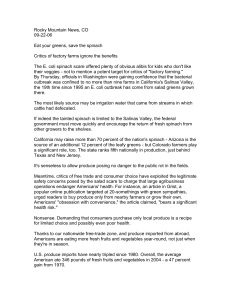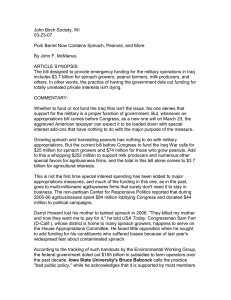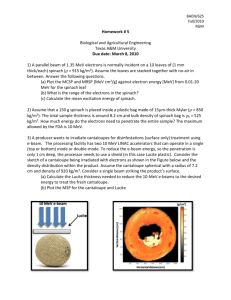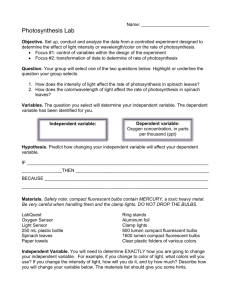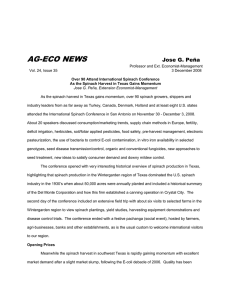AG-ECO NEWS Jose G. Peña
advertisement
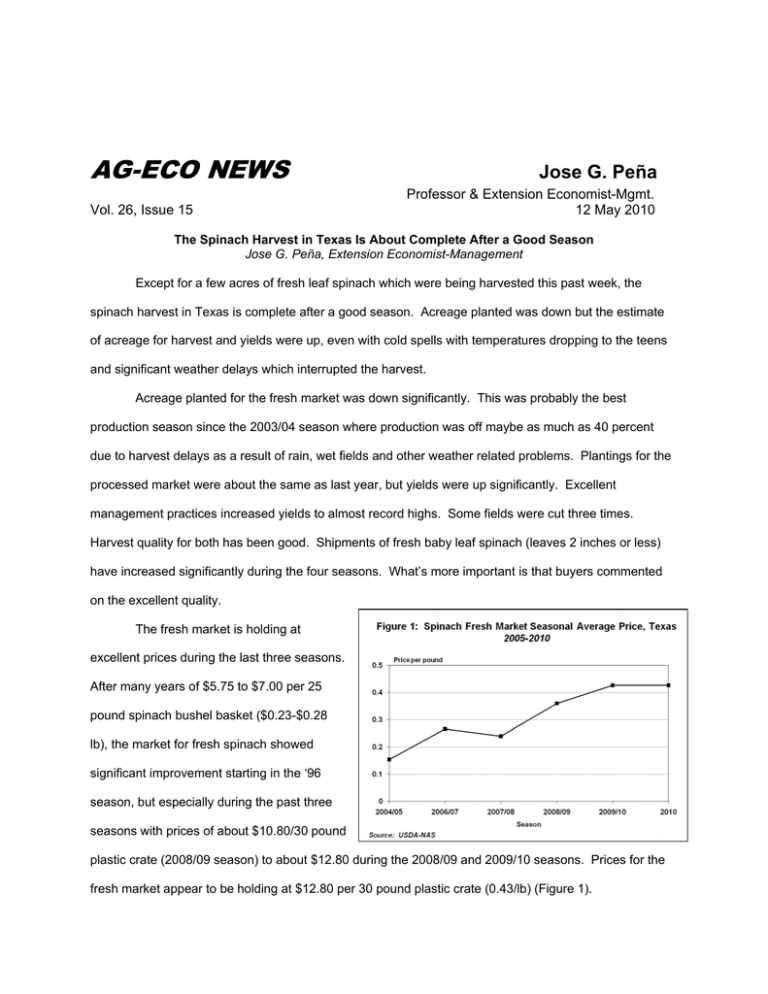
AG-ECO NEWS Vol. 26, Issue 15 Jose G. Peña Professor & Extension Economist-Mgmt. 12 May 2010 The Spinach Harvest in Texas Is About Complete After a Good Season Jose G. Peña, Extension Economist-Management Except for a few acres of fresh leaf spinach which were being harvested this past week, the spinach harvest in Texas is complete after a good season. Acreage planted was down but the estimate of acreage for harvest and yields were up, even with cold spells with temperatures dropping to the teens and significant weather delays which interrupted the harvest. Acreage planted for the fresh market was down significantly. This was probably the best production season since the 2003/04 season where production was off maybe as much as 40 percent due to harvest delays as a result of rain, wet fields and other weather related problems. Plantings for the processed market were about the same as last year, but yields were up significantly. Excellent management practices increased yields to almost record highs. Some fields were cut three times. Harvest quality for both has been good. Shipments of fresh baby leaf spinach (leaves 2 inches or less) have increased significantly during the four seasons. What’s more important is that buyers commented on the excellent quality. The fresh market is holding at excellent prices during the last three seasons. After many years of $5.75 to $7.00 per 25 pound spinach bushel basket ($0.23-$0.28 lb), the market for fresh spinach showed significant improvement starting in the ‘96 season, but especially during the past three seasons with prices of about $10.80/30 pound plastic crate (2008/09 season) to about $12.80 during the 2008/09 and 2009/10 seasons. Prices for the fresh market appear to be holding at $12.80 per 30 pound plastic crate (0.43/lb) (Figure 1). Demand is growing for fresh vegetables, especially for attractive, high quality greens with good taste and high nutritional value. Per capita use of fresh vegetables and melons has been steadily increasing during the last few years, totaling 171.3 pounds in 2009, up about one pound from 170.5 pounds during 2008. In addition, while per capita consumption of head lettuce decreased slightly in 2009, per capita consumption of romaine and leaf lettuce has more than doubled during the last few years. . Spinach falls into the category of high quality, nutrition-packed, leafy greens with excellent taste. While total per capita consumption (canning, freezing and fresh) (Figure 2) dipped slightly after the spinach crisis of 2005, it is refreshing to see that per capita consumption is holding at about 2.4 lbs since 2006. While processed spinach consumption has decreased slightly, most of the increase per capita spinach consumption has been for the fresh market to an average of 1.6 pounds during the last two years compared to an average of 0.8 pounds during 1992-1999. Fresh spinach consumption, however, remains just a small blip in relation to total lettuce per capita consumption of about 28.1 pounds in 2009. It is interesting to note that total spinach production has increased during the past three years after dipping in 2006 after the spinach crisis (Figure 3). Most of the increased production for the processed market has been in frozen spinach. Production for canning has been steadily decreasing, accounting for only 2.4 percent of the 815.2 million pounds of spinach produced in 2009. While some processed spinach production in Texas goes to freezing plants, a large proportion of the current production goes to canning. Spinach Production Shares Spinach production is very important to Texas and especially the Southwest Winter Garden region of Texas where almost 90 percent of the spinach produced in Texas is produced. While California now dominates spinach production, producing about 76.5 percent of the 815.2 million pounds of spinach produced in the U.S. in 2009, Texas produced about 19.3 percent of 191.2 million pounds of spinach produced for the processed market (Figure 4). Appreciation is expressed to Mr. Ed Ritchie, Spinach Fresh Market Grower/Shipper for his contribution to and review of this article.
